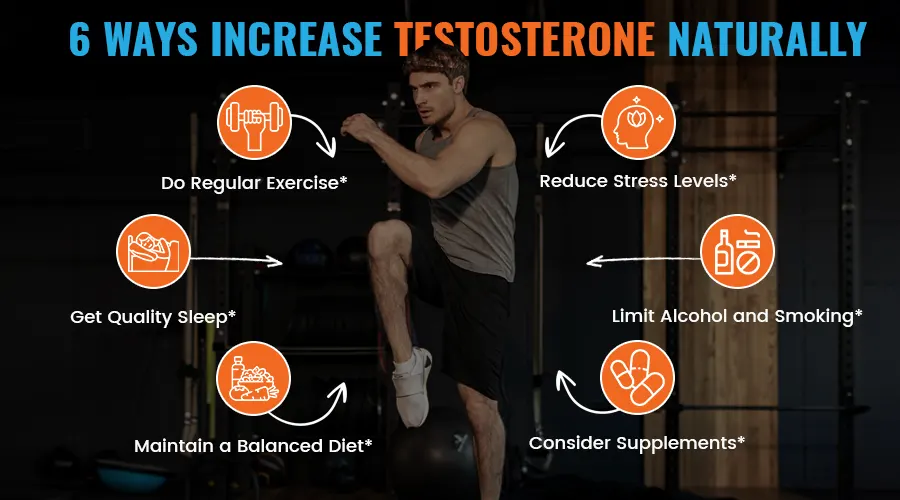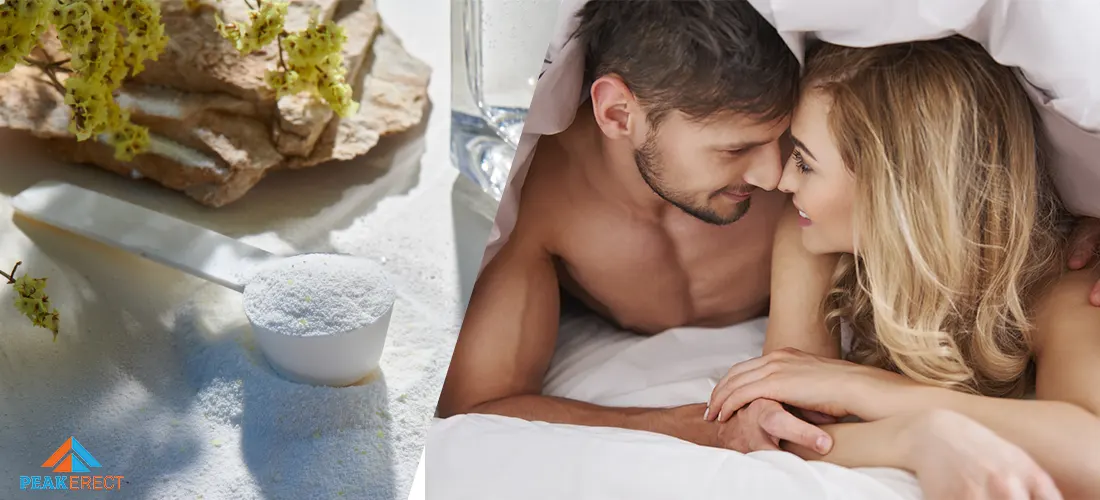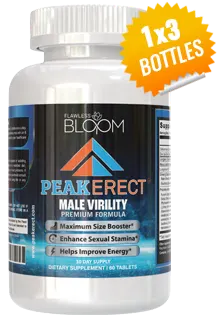Testosterone is a big deal for guys. It’s the hormone that makes you feel like a man – giving you energy, muscle, and that all-important sex drive. But here’s the thing: as we get older, our testosterone levels can start to dip.
That’s where this guide comes in. We’re going to talk about how to give your testosterone a natural boost, with no fancy medical treatments required.
Why go natural, you ask? Well, it’s safer, cheaper, and often just as effective as medical interventions. Plus, these methods will improve your overall health, not just your testosterone levels. Win-win, right?
What is Testosterone?
Testosterone is the main male sex hormone. It’s what puts hair on your chest (literally) and gives you that deep voice. But it’s not just about looking and sounding manly. Testosterone plays a crucial role in:
- Building muscle
- Maintaining strong bones
- Regulating your mood
- Keeping your brain sharp
Signs of Low Testosterone
If your testosterone is running low, you might notice:
- Feeling tired all the time
- Not being in the mood for sex
- Losing muscle and gaining fat
- Mood swings (and not the good kind)
- Trouble concentrating
Sound familiar? Don’t worry, we’ve got you covered.
Exercise: A Key Factor in Boosting Testosterone
Strength Training and HIIT
Want to give your testosterone a quick kick? Hit the gym. Lifting weights and high-intensity interval training (HIIT) are like rocket fuel for your testosterone levels. Here’s why:
- Heavy lifting challenges your muscles, triggering a testosterone boost
- HIIT workouts push your body to its limits, causing a surge in testosterone production
Try to include at least 2-3 strength training sessions and 1-2 HIIT workouts in your weekly routine.
The Role of Regular Physical Activity
Not a gym rat? No problem. Any regular exercise can help keep your testosterone levels healthy. Even a brisk 30-minute walk each day can make a difference. The key is consistency – find an activity you enjoy and stick with it.
The Impact of Diet on Testosterone Levels
Balanced Diet
There are certain testosterone-killing foods that you must avoid. A balanced diet is crucial for maintaining healthy hormone levels. Aim for:
- Lean proteins (chicken, fish, lean beef)
- Healthy fats (avocados, nuts, olive oil)
- Complex carbs (whole grains, sweet potatoes)
Key Nutrients
Some nutrients are testosterone superstars:
- Zinc: Found in oysters, beef, and pumpkin seeds
- Vitamin D: Get some sun or try fatty fish and egg yolks
- Magnesium: Load up on leafy greens and nuts
Foods to Include In Diet For Better Testosterone
Want to boost your testosterone through your diet? Try adding these to your shopping list:
- Fatty fish (salmon, mackerel)
- Eggs
- Nuts and seeds
- Leafy greens (spinach, kale)
- Beans and legumes
The Importance of Stress Management
How Does Stress Affect Testosterone?
Stress is a testosterone killer. When you’re stressed, your body pumps out cortisol, which is like kryptonite for testosterone. The more stressed you are, the lower your testosterone levels can drop.
Techniques for Reducing Stress
Time to chill out:
- Try mindfulness meditation (even 5 minutes a day can help)
- Get into yoga (it’s not just for the ladies)
- Practice deep breathing exercises
- Take regular breaks during your workday
- Spend time in nature
Find what works for you and make it a regular part of your routine.
Relation Between Sleep & Testosterone Levels
The Sleep-Testosterone Connection
Beauty sleep isn’t just for looks – it’s for testosterone too. Your body produces most of its testosterone while you’re catching Z’s. Skimp on sleep and your testosterone levels can plummet.
Sleep Hygiene Tips
Here’s how to get that all-important shut-eye:
- Stick to a regular sleep schedule (even on weekends)
- Create a sleep-friendly environment (cool, dark, and quiet)
- Avoid screens before bedtime
- Cut back on caffeine in the afternoon
- Try relaxation techniques before bed
Aim for 7-9 hours of quality sleep each night.
Supplements to Boost Testosterone Production
Essential Supplements
While a balanced diet should be your first line of defense, some supplements can give your testosterone a helping hand:
- Vitamin D
- Zinc
- Magnesium
- Ashwagandha (an herb that’s been shown to boost testosterone)
How to Choose the Right Supplement For High Testosterone
Not all supplements are created equal. Here’s how to choose wisely:
- Look for reputable brands
- Check for third-party testing
- Start with the basics (like vitamin D and zinc) before trying anything exotic
- Always consult with your doctor before starting a new supplement regimen
Lifestyle Choices and Their Impact on Testosterone Levels

Maintaining a Healthy Weight
Carrying extra weight, especially around your midsection, can lower your testosterone levels. The good news? Losing even a small amount of weight can give your testosterone a boost.
Avoiding Harmful Substances
Some things are just bad news for your testosterone:
- Excessive alcohol consumption
- Smoking
- Recreational drugs
Cutting back (or better yet, quitting) can do wonders for your hormone levels.
Exposure to Environmental Toxins
Modern life is full of testosterone-lowering chemicals. Here’s how to minimize your exposure:
- Use glass or stainless steel containers instead of plastic
- Choose natural personal care products
- Avoid handling receipts (they often contain BPA)
Medical Considerations to Increase Testosterone Naturally
When You Should Seek Medical Help
If you’ve tried these natural methods and still feel off, it might be time to see a doctor. Consider medical help if:
- You’re experiencing severe symptoms of low testosterone
- Natural methods haven’t improved your symptoms after several months
- You have other health conditions that might be affecting your hormone levels
Thinking TRT?
For some guys, testosterone replacement therapy (TRT) might be necessary. This involves getting testosterone through gels, patches, or injections. But remember, TRT is a serious treatment with potential side effects, so it’s not to be taken lightly.
FAQs
How long does it take to see results from natural testosterone-boosting methods?
It can take anywhere from a few weeks to a few months, depending on your starting point and how consistently you apply these methods.
Can women benefit from testosterone-boosting techniques?
Yes, women also produce testosterone (in smaller amounts) and can benefit from many of these lifestyle changes.
Are there any side effects to naturally boosting testosterone?
When done through healthy lifestyle changes, there are generally no negative side effects. However, always consult with a healthcare provider before making significant changes to your diet or exercise routine.
Can testosterone levels be too high?
Yes, excessively high testosterone can lead to issues like acne, hair loss, and mood swings. This is why it’s important to focus on natural methods and consult with a doctor if you have concerns.
Does age affect testosterone levels?
Yes, testosterone levels naturally decline with age. However, healthy lifestyle choices can help maintain optimal levels regardless of your age.
Final Words on How to Increase Testosterone
Boosting your testosterone naturally is all about living a healthy lifestyle. Exercise regularly, eat well, manage stress, get enough sleep, and be mindful of what you put into your body. These aren’t just good for your testosterone – they’re good for your overall health.
Remember, changes won’t happen overnight. Be patient and consistent with these strategies, and you should start feeling the benefits in a few months.
You may also like: Ways To Increase Seminal Fluid




